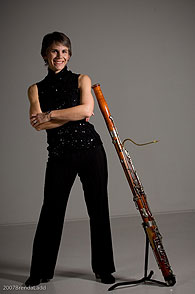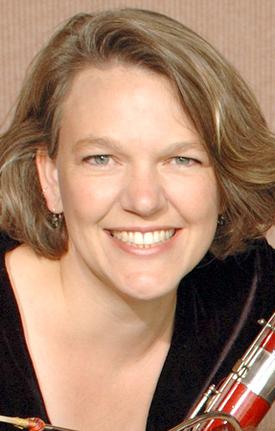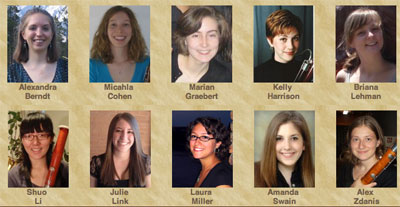By Mike Telin
The Meg Quigley Vivaldi Bassoon Competition and Symposium gets underway on Friday, January 15 at the Oberlin Conservatory. As background to the event, I reached Founders and Co-directors Kristen Wolfe Jensen and Nicolasa Kuster for phone interviews last week.
Kristin Wolfe Jensen

Mike Telin: How did the idea for this competition come about?
KWJ: Nicolasa and I were sitting in a Café in Buenos Aires at the 2001 International Double Reed Society Convention. We had been friends at Oberlin, and we were talking about how we would like to see more young women bassoonists empowered. It seemed as though the majority of bassoonists who were participating in International competitions for the bassoon were male although at least 50% of bassoon students enrolled in music schools were female; so why are female bassoon students not succeeding in International Competitions? We had to ask ourselves what was causing this to happen. I think at that time about 72% of principal bassoonists in orchestras in the United States were male, and why were the females not rising to the top? There has been some change in this in the past decade, which is good.
We though it would be great if we could create some organization that could promote excellence in female bassoonists. Nic happened to have a friend who loved women’s issues and loved Vivaldi, and loved the bassoon. She had also come into a lot of money and was very willing to support this cause. Nic and I spent a lot of time on the phone talking about where we wanted to go with this. What would be most beneficial? So we started with the idea of a competition, and set the age limit at 24, so that it would encourage the really young students to work hard towards submitting a preliminary recording. During the first two competitions in 2005 and 2007 the panel of judges chose 5 finalists from the recordings.
We advertised as much as we could throughout North, Central and South America. Nic has ties to Panama and would love to see South Americans come more into the international music scene. So that’s sort of how it all got started. We had a passion for improving the lot of female bassoonists, and we were very fortunate to come upon Nic’s friend, who was the beneficiary of the Meg Quigley estate, so that’s where the name comes from.
MT: How did Vivaldi’s concerto #26 work its way into the competition?
KWJ: Vivaldi wrote well over 30 bassoon concertos. This one, number 26, was still unpublished, so we, I mean the organization, hired Nicholas McGegen, Nadina Mackey-Jackson and Guy Few in Canada to arrange this concerto. Nadina has been a very big help and inspiration to us from the very beginning. So they took the score and had a keyboard reduction made, so it is also playable with piano, and then they arranged the orchestral parts, which we will be using in the finals. This year the finalists will be able to perform this with orchestra conducted by Webb Wiggins.
MT: Who is Meg Quigley?
KWJ: Nic will probably be able to answer that better then I, but Meg Quigley came from a wealthy family and I can’t give you more details about her life, although I know she died of cancer around age 50, maybe 15 years ago. She also supported other women’s causes. I believe she also supported scholarships for women and that sort of thing.
MT: How has the competition evolved over the years?
KWJ: It is a definite evolution. The first two competitions were attached to the International Double Reed Society Conferences, so for the first competition in 2005 I happened to be hosting the IDRS conference here in Austin. The day before the conference began we had the finals of the competition and then we gave free passes to the competitors for the conference, so they could also have the educational experience of attending the conference. We did that as well in 2007 when the conference was in Ithaca, and the conference hosts were very generous to give us the space. Both times we were also able to offer the winner of the competition a recital during the IDRS conference. Again the stars were aligning, since I, of all the people in the entire world, just happened to be hosting the conference in 2005 and therefore I was able to slip this unknown competition winner into the conference program. This was a great way to publicize our new competition and the philosophy behind it. We really didn’t want to continue riding the coattails of that organization. We thought it would be nice to have our own mini-conference, again focusing on women, although we are inviting the entire world, and we hope everyone who attends will benefit as well. I am sure this is going to be a very inspirational weekend.
MT: How did you end up holding it in Oberlin?
KWJ: Well again, the stars aligned. George was able to talk to the Dean of the Oberlin Conservatory, David Stull, who also happened to be a classmate of mine. He knew about the competition, and was very generous, and very supportive of the philosophy, and the cause.
Nicolasa Kuster

Mike Telin: How did you arrive at the mission of the competition? I spoke to both George and Kristin yesterday, and they both said that you would be able to give the best answer to this question.
Nicolasa Kuster: Ah that’s so funny that they both put you on to me.
MT: George said your going to write a book about it someday?
NK: Yeah, someday when I have the time, I’ll do all the studies I’d like to do, but basically what happened is that I arrived at this place in my career on the academic circuit, and I had had my own experiences in competitions. As things began to progress in my own career I realized there were a lot of things that bothered me about the music world, and I knew that I would not be able to figure out everything that bothered me, but I just didn’t understand why many of the bassoonists in undergraduate school were girls. But, at a certain point you look around and the top teaching jobs, and orchestra jobs were all held by men, and it sort of just dawned on me as I was sitting there watching the finals of the Gilette competition at the International Double Reed Society in Buenos Aires in 2001, that maybe we need to have an earlier competitive experience of girls. I knew that I was not going to be able to figure out the theories behind everything that bothered me about the music world, but I felt that just maybe if we could create something that would give a competitive experience for girls; it would be a good thing.
MT: There are some components to the competition that are not often part of competitions.
NK: There are couple of components of this competition that are unique, the audience engagement part as well as the fact that we give the judges’ comments to everyone who has entered from every round. This is unusual because most competitions do not give the judges comments to the contestants. So it wasn’t just creating a competition for girls it was let’s create a competition that would teach them other things as well. Such as the audience engagement component which draws attention to the fact that in our changing musical world musicians are now required to be involved in the creation of programs that do engage the audience. When I started teaching I realized that, wow, we as musicians are now being required to do this, and I’m not really sure how to teach it either. When I see the girls struggle with this component, I again realize that this is a very good thing to include in the competition. Today a musician has to be able to connect to the audience.
It’s interesting that Vivaldi wrote these concertos for young girls, and they were performed behind a screen, and there was absolutely no audience engagement what so ever. When you go to the church in Venice, you see the screen that the musicians stood behind, and the audience sat in the pews and just listened to the music. This is in stark contrast to how it is today. Number one, you have to be able to connect to the person you are playing for.
MT: Was it easy to gain support for the MQVC?
NK: In the beginning we wondered how much support we would get for this idea from the mainstream bassoon world, but as it turns out, we have been getting a lot of support every step of the way, which is so exciting.
MT: There are not a lot of competitions that a bassoonist can enter.
NK: No, the Gillet-Fox competition is really the only competition for the bassoon, and it happens every 2 years and is part of the IDRS. It is my hope that this competition will give young women the courage to enter that competition. Also their top prize is $8,000 and ours is more. The Gillet competition is really the only competition for bassoon that is offered on a regular basis. I competed in it, and would always call for my comments, and I would always be told that I couldn’t get them. The last time I entered I traveled to hear the finals, because I was really curious as to who was in the finals. What I really hope is that through our competition, the girls will get the courage to enter that competition.
What I find interesting is that there are so many youth orchestra competitions, and I would hear about girls winning, and the first year we had the Meg Quigley competition we had a higher number of entrants then the Gillet competition had. That competition is open to bassoonists from around the world up to age 31. Our competition is just for girls from the America’s up to age 24. So, it seems like the desire to enter a competition is there. Someday if I ever get a degree in women’s studies or sociology I’ll be able to figure out all of this, but for right now I just go on gut feelings.
MT: Can you tell me a little about Meg Quigley?
NK: Well the family really wants to remain in the background, but it was the Vivaldi part, and his writing for young girls that caught the attention of the family member that I spoke to. It was very much in line with the projects that Meg Quigley funded, projects that enabled women. That also why we had the Vivaldi name in it from the very beginning. Initially we wanted to call it the Meg Quigley Vivaldi award, and not even call it a competition, because the family really wanted to help in a significant way. These prizes are big especially in our field. They didn’t want this memorial to Meg Quigley just to be something little on the side. Meg herself was a writer, artist and benefactor to the arts.
MQVC is open to the public as well as to bassoonists. Single day registration (January 15, 16, & 17) is $25, single events $10. All programs are held at the Oberlin Conservatory of Music. For concert details, see ClevelandClassical.com’s concert listings. Complete schedules and bios of competitors and performers are posted on MQVC’s website.



